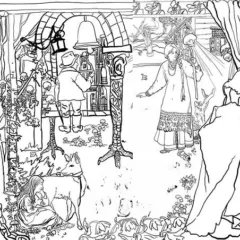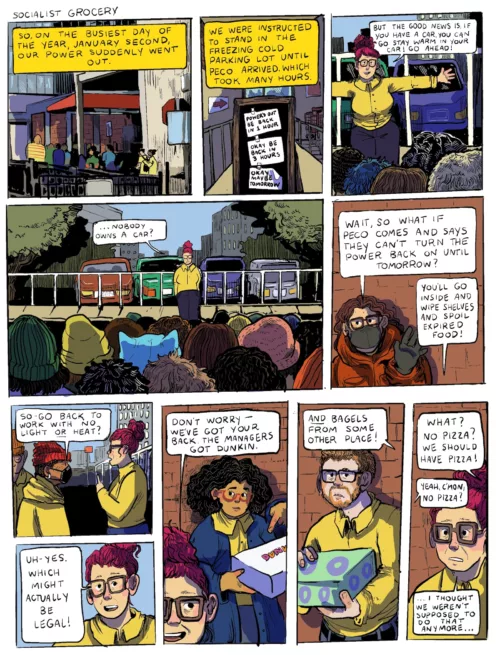
In this edition of Artblog Radio, Artblog contributor Jessica Rizzo has a wonderful conversation with playwright Kate Tarker about her original play, “Dionysus Was Such a Nice Man.” The two discuss mythology, its effect on gender and gender roles, and the ways in which this play flips that script by creating a world of complex female characters and analyzing the patriarchal systems that nurture male aggression. Tarker self-proclaims her word view as “comedic” and explains how that shapes her writing. Is is a comedy about tragedy? Or a tragedy about comedy? Tarker says it’s both, rather than a tragicomedy, which blends the two genres too neatly. Catch “Dionysus Was Such a Nice Man” at the Wilma Theatre, April 23, 2019 – May 12, 2019! And catch Kate Tarker’s panel discussion about the play on April 18th, 2019 at Kislak Center, Penn Libraries, University of Pennsylvania.
The podcast interview is 18:56 minutes long. ARTBLOG RADIO is now available on Apple (iTunes and Apple Podcasts) and Spotify, and available via RSS. This podcast was recorded by Kate Tarker.
Read the full transcript below:
Jessica Rizzo: Hello. You’re listening to Artblog Radio. My name is Jessica Rizzo and I’m here with playwright Kate Tarker at the Wilma Theater in Philadelphia, where her new play Dionysus Was Such a Nice Man will have its world premiere, running from April 23-May 12. Hi Kate.
Kate Tarker: Hello Jessica.
JR: Thanks for being here today.
KT: I’m very happy to be here.
JR: My first question is about your title, which is very interesting. It instantly situates us in a world where there is an operating classical, mythological frame of reference, but at the same time it’s very contemporary, even casual or laid-back in tone. Do you think that’s an accurate description of the world of this play?
KT: Absolutely. The play is looking at some of the origins of theater and the origins of tragedy as we understand it and talk about it in the theater and then applying it to very contemporary lives. It examines the way we’ve inherited tropes and ways of thinking about gender and tragedy from millennia ago and how those are still rippling through all of our experiences.
JR: You also have a wonderful epigraph that readers of the script will get to enjoy, but I wanted to share with our listeners. It reads in its entirety “Life is a party / Don’t puke.” Could you tell me how this—I’ll call it a poem—captures the spirit of the play for you?
KT: “Poem” is very generous, but I’ll take it. I wrote it in there as a guideline for myself to stick to what I’m really interested in here and what’s important to me, which is looking at “too much fun.” When does fun become tragic? What’s the line? When does pleasure spill into something else and when does one person’s pleasure spill into someone else’s pain? So there’s a lot of celebrating and partying. The whole first act is a party followed by preparing for another party. There’s a real spirit of celebrating life that then turns dark at unexpected times.
JR: Without giving away anything you don’t think you should give away, could you tell me in your own words what happens in the play?
KT: The play is about the family that adopted Oedipus when he was a baby, the family of shepherds. It’s playing with the actual Greek mythology that we have handed down. The classical version that we have is that he was adopted by a king and a queen, but in my version that’s a lie and Oedipus is a great big liar and he comes from much humbler stock. So it’s about reinvention, self-reinvention in the face of a very difficult, troubled childhood.
JR: One way this play is being described is as a comedy about your childhood being a Greek tragedy. Is this play a tragedy or a comedy? Or perhaps a tragicomedy?
KT: It’s both. It’s a comedy about tragedy. It’s also sort of a tragedy about comedy. I think those are both more accurate descriptions than tragicomedy, which makes it seem like things just blend into each other. But I’m very interested in humor and thinking about humor, which a lot of female writers and comedians are right now. In a way, I feel like this play is part of a tradition of women being the arbiters of “funny or not?” Looking at the line between humor and predation. Historically women have been assigned to the role of laugher, and it’s been our job to listen to a joke told by a dude and say if it’s funny or not by laughing. But what I’m doing as a writer is both telling the jokes and finding places in the script to say, “this is funny” or “this is not funny,” “this is appropriate,” “this is not appropriate,” and to have a deeper conversation around that.
JR: So, according to Freud, everyone’s childhood is in a sense a Greek tragedy or modeled on Greek tragedy. Do you agree? Is there something universal about the fantasy that one is adopted? About ambivalence towards one’s parents?
KT: Probably! I’m not really a Freudian. I’m more of a Jungian. So I can’t give you amazing psychoanalysis about it, but my childhood was definitely a Greek tragedy. Was your childhood a Greek tragedy?
JR: Oh, absolutely.
KT: Well, there you go! I assume it’s true for most people. And definitely the play is about tragedy as this force that can course through anyone’s life at any unexpected moment and how we handle that, this strange force that visits us and can leave again.
JR: In the theater we think about tragedy as evoking pity and fear. People might say that understanding one’s childhood as a tragedy is a self-pitying move. Do you think there’s something more useful or interesting about this framework for you?
KT: This play is obsessed with self-pity. There’s a central patriarch character, Polybus, who is just a paragon of self-pity and flings himself about in the play. And he ultimately is more resigned to his fate in a way that determines his fate. So the self-pitying character is the one who fares the worst in the play. And then we have another character, Merope, who has sort of a blind optimism, but since it’s not grounded in reality she also fares poorly. And then we have another character, Alcinoe, who is a victim in the first act, but in the second act finds real strength and works to move past it. And we don’t know what her ultimate fate is past the end of the play, but she brings real resilience and strength and genuine attempts at avoiding self-pity to her experiences. So she has the most hope of actually overcoming.
JR: I was really interested in the character of Alcinoe. In what I think is a wonderful and unexpected move, in your second act you have her emerging as a protagonist. Your Thunderbodies, which premiered at Soho Rep in New York last year, also features a powerful female protagonist, Grotilde, who you’ve describe as an “endless fountain of rage.” I think that could arguably be applied to Alcinoe as well. What about female characters who are endless fountains of rage appeals to you?
KT: Well clearly I need a vehicle for my feelings. I don’t want to sell those characters short. Well, Grotilde truly does inhabit that for the entirety of the play, but Alcinoe actually inhabits two poles of female experience that I’m really interested in—vulnerable innocence and completely empowered rage. I think part of what I’m trying to do is express and empower the full range of experience by creating female characters who exist at opposite poles of that.
JR: Much of the play focuses on the bad behavior of powerful people, mainly powerful men, on justice, and on accountability. Whatever was it about our moment in history that made you want to write a play oriented around these themes right now?
KT: Yeah, gosh, I don’t know. What’s going on in this moment? This has been labeled a “Me Too” play, which is not wrong, but I mean I just am of my moment. I wrote it before we had the hashtag, but obviously I was a part of something that was already bubbling up. I was trying to process some of my own personal experiences in writing this. I was angry. I was so angry. We’d had some really high-profile rape cases in the news that I found quite upsetting, and I just felt a real need to reckon with that. But I also felt a need to write about the male characters with depth and compassion and to find what’s loveable about them. So it’s really not a play with villains and victims. It’s a play that looks at how painful it is to love someone who has done you wrong.
JR: I’m curious about your writing process. Is this the first time that you’ve written a play borrowing characters and scenarios from the Greeks? Did you begin with these themes that you wanted to explore and then bring in the classical characters or did you begin by wanting to rewrite Oedipus?
KT: Well, what’s great about most of the borrowing I’ve done is that most of the characters are just footnotes in mythology. They don’t really exist as fleshed out characters that have been handed down. Oedipus is the exception to that, but it was also fun to take a character who has been conceived in a certain way and have the gall to say no, no, no, he’s completely different from that. Everything you know is lies. I think I’m sort of a weaver as a writer. I’ll take strands of different things and collage them into a new character, and I think I’ve done the same with my so-called Greek characters here. Polybus, the central patriarch of the play, he’s actually a combination of Polybus, who we don’t know a ton about, as well as Pablo Picasso and Silenus who was a drunken companion and tutor of Dionysus. Those are the three fibers that I’ve woven together in creating him.
JR: We don’t have as many tragedies about women or with women as protagonists as we have tragedies featuring male protagonists, and I wanted to ask you why you thought that was. Do you think that there’s something gendered about tragedy as a genre? Is it biased towards depictions of what some have called the “titanically striving individual” man? Is it less appropriate for representing the struggles of women whose experiences of the world might be more relational, more communitarian, or passive? Or is that a hopelessly old-fashioned way of looking at things?
KT: It’s an interesting question. Most of literature that we have and celebrate from our history just is from the male point of view, right? That’s just the point of view we’ve been living with forever, so there’s just a male slant to it, especially with the ancient Greek tragedies. I do think there’s something interesting if you look at TV, stepping away from theater for a moment. There’s been this huge blossoming of half-hour dramedies with female protagonists and often female writers, and male TV has skewed more towards this expression of hour-long, anti-hero male tragic figures, so I think that’s an interesting way that that split is still manifesting itself now. I think there’s something about female writers because we’re outsiders in a way to this tradition, right, it’s not ours—we can steal from it and rework it and borrow from it if we want, but it’s not necessarily our tradition—there’s a greater willingness to mess around with genre. Genres are just habits to me. They’re not things that I feel like I must be absolutely beholden to or grovel in front of. I think that the half-hour female dramedy really displays that too, where women are really willing to play with form and toe the line between whether something’s funny or tragic or something else even.
JR: Right, so if we as women are outsiders to begin with, there’s less attachment to respecting the divisions between genres as something sacrosanct or inherently valuable.
KT: Yeah, that’s what I think.
JR: Speaking of comedy, I know that you have studied clowning with the great Chris Bayes. I think you do an extraordinary job in this play and in other plays you’ve written of using clowning and humor to address what could be very painful themes. What have you learned from studying clown yourself and how does it manifest in your writing?
KT: Oh man, I feel like everything I write was impacted by that. It was pretty formative for me. I studied it in grad school. I’m always a little hesitant to talk about clown because there are so many ideas about what that is, many of which have nothing to do with what I really studied, but clowning as it was taught to me by Chris Bayes is ultimately not so much about the red nose or the costume, neither of which I use in my work, but about finding this really raw emotional truth and being really playful and expressive and embodied with emotions. So you go to a pure state of anger or a pure state of despair, and you release the floodgates in a way that you don’t with more naturalistic acting. And I love that so much. I love the playfulness of that and I love the vulnerability of it. It’s a moment where we really get to see the real you and the child you shining through.
JR: Some of the best clown work is totally nonverbal. Do you feel that there are times when words just get in the way? How do you think about this problem as a playwright?
KT: Yeah, I think about it a lot. Right now I’m trying to think about the very beginning of the first act of this play because there are a lot of words in it right now, but it’s a party, and I’m hoping that once we get into rehearsal we’ll be able to strip away a lot of the words and just rely on people being really dumb and genuinely having a good time in front of you to convey a party. Because everyone can tell when actors are just pretending to have a good time on stage.
JR: Yes, and as our listeners may or may not know, the Wilma has something very rare in the American regional theater—its own resident company of actors who train as an ensemble together, the HotHouse company. What are you looking forward to about working with this company? And it was commissioned specifically for this group, correct?
KT: Yes, it was.
JR: Did knowing who you were writing for change your writing process at all? I know you haven’t started rehearsals yet.
KT: Yes, but I’ve been working with the actors pretty closely and we did a week-long workshop a year ago and we did two readings on HotHouse Mondays, which is when the whole company gets together. I definitely was excited about writing this play for the Wilma, because the Wilma is kind of a house of tragedy and they do this really intense warmup. I don’t even know how to describe to you. It’s truly bizarre and alien. It involves this heavy breathing, this sort of [breathes tragically], the tragic breath, and I temperamentally, my worldview is comedic. It just is. So it was exciting to me to come to this company and take this group that is so steeped in tragedy and mess around with it and see what happens.
JR: Well, I can’t wait to see what happens myself.
KT: Yes, please come!
JR: Is there anything else that you would like to share with our listeners that I didn’t ask about?
KT: I’m so excited to see you at the theater!
JR: Thank you so much for your time today, Kate. I also want to let our listeners know that on April 18, Kate Tarker will be appearing on a panel with a number of artists and scholars to have what’s sure to be a fascinating discussion about her play and some of its avant-garde influences. That will be at the Kislak Library at the University of Pennsylvania. More details about that will be made available soon. And be sure to get your tickets for Dionysus Was Such a Nice Man at the Wilma Theater, April 23-May12. I’m Jessica Rizzo. Thank you for listening to Artblog Radio.





